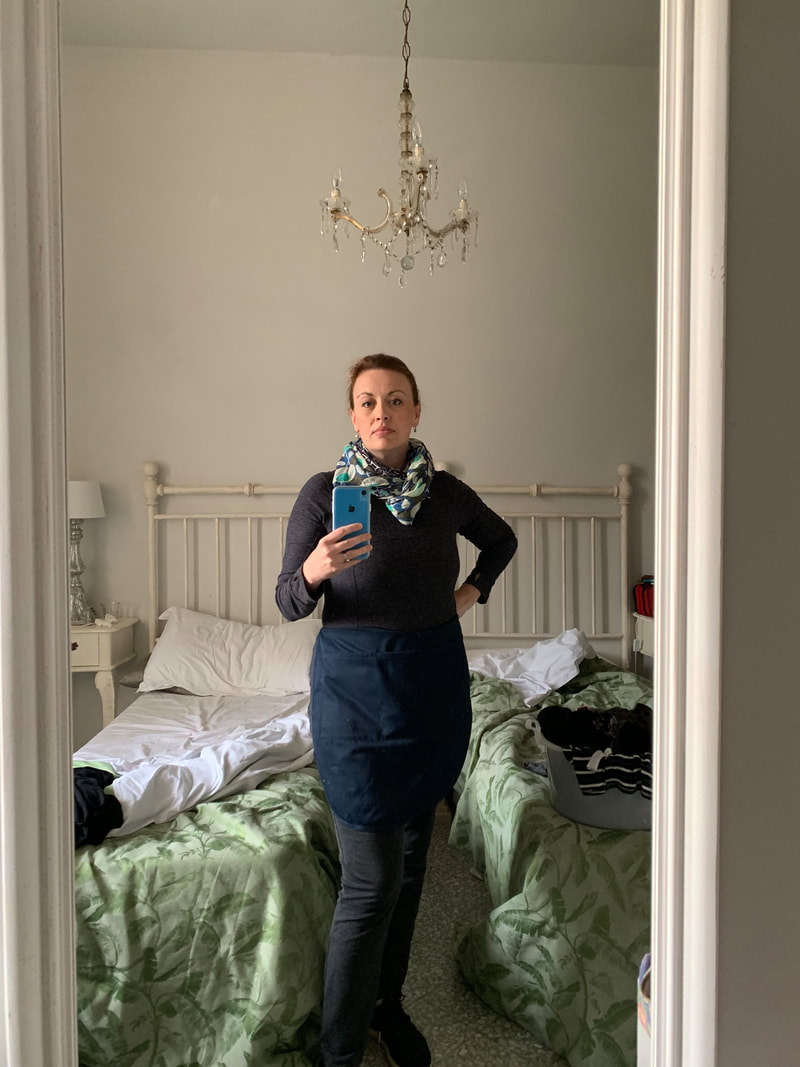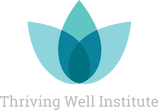|
“How’s it been going for you?” I asked my client last week.
“These days are hard and wonderful,” he said. The simplicity of that really struck me. He’s right. Duality is profound. Back in March, when Covid kicked into high gear, I scooped up a few items from my office to dive into a make-shift telehealth operation at home, I never thought 7 months later, I’d be strangely adjusted to this new normal unattached from the timeline of how long it will be this way. But here I am. The pandemic has been incredibly intense for so many people. Some have experienced significant loss, trauma and tragedy, others are just mildly annoyed by the inconvenience of it all, but everyone has been forever altered in one way or another. The first few weeks of managing the shift from in person therapy sessions to exclusive telehealth sessions was intense! My regular practice full of high functioning clients who mostly experience mild to moderate complications and symptoms were suddenly launched into a new level of intensity I’ve never seen in my entire career as a therapist. Almost every single session shifted from their original presenting problem to coping with a tremendous amount of anxiety and uncertainty. Every single session focused on one common topic - coping with the pandemic. Adjusting to a zoom, phone or facetime platform after spending my entire career sharing a whole therapy room with each client felt very confining, limiting and required an enormous amount of focused energy. On top of that, the pandemic poured gasoline all over every single session and lit them all on fire in one giant burning inferno of stress, trauma and tragedy. As therapists, we are clinically trained to handle a lot, but this was unprecedented. I leaned hard on my family for that first month. My husband closed the doors temporarily to his bakery that he had been running nearly nonstop 7 days a week for the past 7 years. He caught up on years of lost sleep in about a month's time and carried away my teacups between sessions and left me bowls of hot soup and little sandwiches on trays outside my therapy door that I could grab between clients to keep me going. My kids cleaned the house and folded baskets of laundry. They walked the dog with me and like many across the globe, we did puzzles, played games, got crafty, baked bread and cleaned out closets to pass the time while in lock down. I completely stopped blogging, dreaming, planning and thinking big. I was mostly in survival mode, just like everyone else. We had to pull down 2 international culinary tours we had already booked and planned in France and Italy, and all of my plans to launch another international retreat were also halted. But that stop action actually allowed me to awaken. I stopped running so fast and started to merge into slow living. Things felt a little easier in some ways. My entire social calendar was wiped clean. All of my board meetings, all the activities for my kids, all of our plans came to an abrupt stop. I was able to make more time for long walks in my neighborhood, sleeping in a little later, not worrying about putting together fancy work outfits, jewelry and heels. Suddenly less was more and that was really wonderful. But the duality existed and at the same time I was slowing down and relaxing into this new pace, I was also helping calm my daughters fears about her transition to virtual high school and helping prepare my son to move abroad in August for his university studies in Lund, Sweden. We weren’t even sure until the last minute if he would be able to get there, considering the US travel ban to Europe and how high the Covid numbers were in the states. But I’m proud to say, he made the journey safely, navigating 4 border crossings alone, mid-pandemic and is thriving now in his program at Lund University. All in all, I am immensely grateful. I have a deep sense of gratitude that my family and friends are safe, that I’m able to provide support to the clients I care so deeply for, that I’ve been able to not only adjust to telehealth sessions, but am absolutely loving it now and that even during the pandemic, I also managed to build and launch an online course that trains other therapists on how to build a thriving practice - AND - I’ve added a therapist under me to form a group practice because I have been getting so many referrals, I decided it was time to expand in order to meet the growing need for care. So yes - these days are “hard and wonderful” and what I’ve gained the most from this time is a sense of presence and connection with myself, my health, my family, my work, my purpose and even simple pleasures like slow cooking, reading more, tending to my garden, noticing simple beauty in my neighborhood and the kindness and compassion of good people in the world. I hope this blog reaches you in good health and that your days can be hard and wonderful too.
2 Comments
Listen, I know you’re busy!
I get it! I am too!!! But will you take me up on a little 15 minute self-care challenge this week? Everyday this week can you try to do something self-care related for just 15 minutes? Here are a list of ideas to help you get started: SLEEP:
NUTRITION AND HYDRATION:
SOCIALIZATION / RECREATION / LEISURE
So what do you say? Are you up for the challenge? Just 15 minutes a day for better self-care this week! I felt fierce.
Accomplished. Empowered. We need to stop hiding. Stop playing small. When you feel like a badass - claim it! I’m standing in the messy twin bedroom on the main floor of the 17th century Tuscan villa we rented to host our 2019 culinary tour. I was feeling totally in control and ready to expedite our final 7 course dinner for 22 guests with a team of 3 chefs and 4 servers. Last October, my husband and I rented a stunning villa in the Tuscan hills overlooking Lucca, Italy. We hosted 22 guests for a week of absolute culinary glory! We toured wineries, markets, held cooking classes and hosted elaborate 5-7 course dinners with the freshest ingredients renowned to that region of the world. Each morning we would whip back our sheets and stumble into the kitchen. There was no talking before the coffee was brewed. Freeman would peel, clean and cut up the melons, pineapple and fruit and I would shuffle around the kitchen in a silent but controlled frenzy pulling out plates, silverware, coffee mugs while boiling eggs, setting up trays of meats, cheese, breakfast pastries and bowls of muesli, yogurt, jams and honey. There was something magical that happened to me that week. I embodied a bold sense of chutzpah. The second we stepped into that villa, we owned it! It was my house now. (At least for a week!) Throw me a challenge and I was ready to hit it back over the net! Lead 22 people around an area of a foreign country we’ve never been to before. Done. Navigate specialty food shops, which included figuring out where they were, when they were open, whether or not they would sell to us and do all of this in a language we did not speak. Done. Expedite dinners with 150+ plates per night. Done. On that last night, I pictured myself wearing something elegant. A beautiful dress or sophisticated pant suit. Something that matched the grandeur of the villa and gorgeous Tuscan surroundings with a nod to Italian style and beauty. But that quickly shifted when I realized the impracticality of the outfit and shoes I selected and the trek that was necessary to move 150 dishes from the kitchen to the outdoor lemon house and back - inside, outside, inside, outside. All. Night. Long. I ran back to my room before the 1st course was plated and threw on my most comfortable travel outfit complete with apron and American tennis shoes. (Sorry Italy, comfort and practicality for the win.) There was a chill in the air as the sun started to set that evening, so I grabbed my scarf, which somehow elevated the whole ensemble and caught a glimpse of myself in the mirror and snapped this picture feeling badass and bold. It was show time! The final performance of the week. Pure culinary theater. The whole villa was buzzing with excitement and I felt ready to bring it! Too many times we shy away from owning our power. We shut it down in fear that others will judge us or think we’re too much. I say stop hiding! Let’s celebrate being fierce and share the moments we harness power and courage. Life is too short to let them pass by. The holidays can be stressful! Follow my 5 tips I shared on Thrive Global on boundary management and have a happier, healthier season this year! Click here to connect to the blog.
For the past couple years, I’ve been super healthy! Didn’t catch a single cold or flu bug. And if I felt like I was coming down with something, I had a superpower foolproof protocol I followed every time that helped me knock it out before it ever became a full blown illness.
But this week, it got me. Bad! I was hit with a horrible sinus/upper respiratory/feverish/terrible/no-good/felt-like-death something ‘er other and it took me DOWN for 4 straight days. 4 days! In bed! Too sick to do anything other than stare at the ceiling and think. It was baaaaaaaaad! But I had to merge into full surrender mode and just focus on recovering. I’m on the mend now, hence the blogging! ;) But since we’re approaching cold and flu season, I wanted to share my superpower tricks for warding off illness when you feel it coming on. First: you must be tuned in to your body. (I missed this clue myself over the past 2 weeks - lesson learned!) But if you’re really tuned in, you can feel your body sending you little signals early on, like muscle soreness or fatigue, headaches, a tiny tickle in your throat, a sense of feeling foggy or off balance, a crabby mood, short fuse - there are a lot of little signs if you’re paying attention. Your body will tell you when it’s not operating at 100%. If you ignore it and keep pushing, you might push yourself right over the tipping point. But if you catch these little signs early you’ll be likely to ward off the terrible no-good horrible bugs and germs that can TAKE. YOU. DOWN! Trust me! Here are my 9 best superpower tips for warding off illness this cold and flu season... 1. Wash your hands. This is the single most important thing you can do to stay healthy. Get in the habit of washing your hands as soon as you get home and before you prepare food or eat food. 2. Go to bed earlier than normal. Going to bed earlier helps you get more delta wave sleep - the most restorative form of sleep. 3. Avoid sugar, alcohol and junk food in general. This is the time to flush your body with water and eat immune boosting natural whole foods like all citrus fruits, kiwi, berries, dark leafy greens, eggs, green tea, kefir (and some yogurts low in sugar), garlic, ginger, tumeric, spinach, broccoli, sweet potatoes, mushrooms, legumes (beans and lentils), broth, bell peppers, avocados, salmon, nuts and seeds - particularly almonds, walnuts, chia seeds, flaxseeds, sunflower seeds, pumpkin and hemp seeds. These are a combination of the 16 superfoods and the best immune boosting foods! Load up on these and you’ll be feeling better fast. If you’re looking to make a soothing warm drink - fill a medium sauce pot with about 6-8 cups of water, chop up a big hunk of ginger with the peels on, juice a whole lemon or two and toss the lemon rinds in the pot and add in honey to taste. Bring to a boil, then turn off, strain or don't strain and pour in your favorite mug, sip and enjoy! 4. Salt water is your friend! Use a basic salt water nasal rinse each day to keep nasal passages clear. Gargle with warm salt water if your throat feels scratchy or sore. Or just gargling with plain warm water once a day is also shown to have good effects on keeping your throat healthy and clear. Soak in an epsom salt bath before bed to soothe sore muscles and help promote good rest. 5. Pump elderberry! You can now find elderberry products everywhere in gummy or liquid form. But beware of the gummies that are coated in sugar. Why do they do that? The plain elderberry gummies taste great on their own - who needs the extra sugar? When I start to feel like I’m getting something, I take the maximum dose of elderberry for a few days and it usually does the trick. 6. Skip the airborne and emergenc-C products. They have a lot of sketchy additives. Instead get your vitamin C from real citrus fruits and combine it with Vitamin D to get the maximum effect. 7. Decrease stress and change your mindset. When you think you’re getting sick, cut out everything unnecessary from your schedule. Reduce stress and flip your mindset to one of positivity, gratitude and abundance. Repeat the mantra “I am healthy and strong!” The mind can be highly influenced by suggestion. I’m telling you - can’t hurt, might help! 8. Change your toothbrush head or replace your toothbrush. When was the last time you did this? Can’t remember? Then it’s time! 9. And on the prevention end for staying healthy, make sure you’re getting enough exercise. This is one of the most important things you can do to boost your immune system. Don’t overexert yourself though if you’re feeling run down. Tune in to know if you should exercise or rest when you feel something coming on. Sometimes, despite all our efforts, a bug gets ahold of us anyway. And when that happens, it’s best to surrender, pamper yourself, get tons of rest, push fluids and ride it out so you can #thrive again! Man, I don’t know what it is, but lately I’ve been feeling so aware of how fleeting and fragile life can be. We’re here for such a short, precious few years and as we age, time just seems to be moving faster and faster. It makes me think a lot about my commitment to helping people learn how to harness all the joy and beauty and richness out of life. I feel this enormous sense of urgency right now to give people permission to evaluate what’s going on in their lives and make positive change to what needs attention. Too many times we find ourselves just spinning in stressful little tornadoes - we are whirling around and around and around. We think the answer is to push harder. Work harder. Do more. But we’re wrong. The answer is to pause. There’s healing in the pause because it invites us to elevate our consciousness and awareness. If we take a breath and tune in, we can answer the most important self-care question ever: “What do I need?” Think about it, if we learned how to pause and answer that question honestly, it could lead us to choose a healthy self-care option that might increase our coping and bandwidth. It could prevent us from a hot tempered, emotionally reactive response or reply. It could allow us to move away from the dangerous speed of poor impulse control and change an otherwise destructive choice in our desire to escape, numb or avoid. It could bring us back to a very important state of presence. When we answer this question we’re not being selfish. We’re actually inviting ourselves to be brave and accountable and as a result, we can feel peace, joy and compassion. I hear clients ponder about the ebbs and flows of emotions. It’s almost as if they are questioning “am I doing this wrong? Because sometimes I’m feeling really good and then other days, I dip.” That’s NORMAL! We cannot expect that if we work hard on therapy strategies we’ll wake up one day to a new constant state of happiness and joy. If you’re alive, you will struggle. Period. When we accept this construct, we embrace that being uncomfortable sometimes is normal. If we know that this is true, then we can start to understand that most suffering is temporary and there are things that we can do to help ourselves feel better and improve our distress tolerance. The problem is, we have normalized burnout and overwhelm and I fear we’ve started to become accustomed to a life absent of pleasure, joy and momentary wonder. That’s the part that terrifies me! We don’t have to live our lives like we’re just surviving them! There’s another way of doing it. We can learn how to thrive and I’m starting to really understand that if we bring our attention to these 5 key principles, things start to shift in a positive direction:
There is a formula that helps us move from surviving to thriving and I’m committed to sharing everything I know about it with you here! A lot of people ask me about managing anxiety. As a psychotherapist, I recommend first ruling out a medical condition. A simple visit to your primary care doc and a fasting blood draw can help you determine if your anxiety symptoms are related to an underlying physical condition or vitamin deficiency or if they're stress induced.
My second line of defense is to focus on self-care practices. When clients come in for therapy, no matter what the issue is, I find it's important to assess how their fundamental self-care practices might be impacting their ability to cope. When we're sleeping well, eating clean and moving our bodies we expand our distress tolerance and our emotional reactivity decreases. Healthy self-care helps us create a well of resiliency that we can draw from which helps us pause and make conscious decisions about how to respond and react. If we're not sleeping well, our diet is poor and we don't make exercise a priority, we hit a stressor and we tend to fall all the way down the rabbit hole. Anxiety increases when we feel uncertainty or have the perception of being trapped. I coach clients to reframe their thinking and free up all the options in their mind so they can pop the balloon of worry and stress. When we use techniques like Cognitive Behavioral Therapy, we learn how to stop our thought process and think carefully about whether or not the thought we're having is based in reality or distortion. Many times anxious thoughts are hinged on an attachment to a hypothetical 'what if' instead of a reality based thought based in evidence and truth. I also remind clients that their anticipatory anxiety is typically greater than the actual event. Whatever we imagine about what's coming next is typically much worse than whatever actually occurs. If we can learn to move away from that state of anticipatory fear and drop into evidence based thinking, our anxiety will decrease. Mindfulness is another great strategy to help people feel less anxious. When we engage our senses and move into an awareness of the now, we bring ourselves to a feeling of calm and gratitude. Most anxiety stems from worries about what's next. Mindfulness invites us to bring our attention back to the present moment and simple practices like meditation or breath work can help us return to a sense of groundedness and peace. I find many clients spend a lot of time in an imaginary dress rehearsal of what could happen in their future. The hard part is, this way of thinking just robs us of the joy of the now. If we should have to face something stressful in our future, no amount of imagining how it will feel or how we will cope with it will ever change the impact if it really does occur. Instead we need to shift from 'what if' to 'what is' and allow ourselves to focus on the moment we're in. Acceptance Commitment Therapy invites us to learn strategies to accept and tolerate stress and anxiety, set it next to us and bring our focus to what we want to commit to. This is best illustrated in the example of being a bus driver. Imagine your job everyday is to drive a bus. You start your day off in an empty bus, buckle your seatbelt and head off on your route. Everything is going great! Until you pick up those noisy "thought" passengers. They get louder and louder and it becomes challenging for you to focus on your job. You have 2 choices here. You can stop your bus and go back there and wrestle it out with those noisy, anxious thought passengers and throw them off your bus, or you can accept that those thoughts get on and off your bus everyday and instead bring your attention to what's in front of you and commit to disengaging from them and finish your route. When we learn to accept a certain level of discomfort or stress and make a conscious choice to align our attention to what we want to commit to, we regain a sense of control and feel less victimized by our anxiety. Anxiety can be tricky. Sometimes it improves when we take a closer look at it under a therapy microscope and unpack it to see what's really inside. Other anxious thoughts dissipate faster when we consciously decide not to engage with them and instead bring our awareness to something else. Many times, mild anxiety can decrease by increasing self-compassion. When we normalize that everyone feels a little anxious from time to time, we feel less attached to the thoughts and symptoms and the anxiety lessens naturally. However, if you find that your anxiety symptoms start to impede your functioning, then it's time to seek more support. If your anxiety keeps you awake at night or impacts your ability to concentrate, it might be time to see a therapist to help you build a better coping toolbox.  I asked my 13 year old daughter what I should blog about this week and she said "I want to write your blog this week!" Here are Hannah's thoughts on what helps her thrive. She titled her guest blog: Cleanliness. "How you live in your house, how you act when you leave and even how healthy you are all contribute to a simple word we hear all day long. That word is cleanliness. Coming from a teens perspective keeping your room clean is one of the secrets to a clear mind and a clearer future ahead. That seems farfetched but, cleaning your surroundings and living in cleanliness brings more feelings of accomplishment and positivity into your work and life and even can boost your confidence. Coming home to a clean space also can help you unwind and feel serenity in a peaceful resting place for the night. Having a clean room can also reduce stress. When you already have a lot on your plate, then want to go to sleep, you look around and see how much you still have to do not having everything tucked away. You are probably thinking you don’t have the time to clean your room once a week, but so many daily tasks can be done while tidying up. New show you want to watch? Fold some laundry. Have to cook dinner? Clean up before you cook so you are more inspired to cook. A clean kitchen makes after dinner clean up a lot easier. The key to always staying organized is that everything has a place. That way whenever it’s out of its place you can put it back instead of trying to find it a new home or just shoving it in your closet. You should be able to find anything you own in your room if you have a designated space for it. Overall, having a clean environment can effect your grades, work habits, social life, stress, and even how well you sleep. Waking up to a clean room jumpstarts your day and keeps you organized throughout. Coming home to a clean room can help you de-stress and relax for a good nights sleep. So, stop putting it off and get to cleaning!" Hannah really lives by this message (more than I do myself most of the time). She has a weekly routine down to a science. Every Sunday during the school year, she would tidy up her room and select 5 outfits for the week ahead. I noticed how calm she felt heading into a stressful week when she helped her future self by doing simple tasks ahead of time. She even "Marie Kondo-ed" my husbands t-shirts the other day! There's something super satisfying about creating order around you. Hannah's right - when we have a calm environment around us, we feel calmer inside too. I'm not sure I can achieve total order of my own dresser, but she's making me think twice about tidying up! When we hold ourselves and others to a perfect standard, it’s painful. We end up chasing something that doesn’t exist. Perfectionism plagues us and continuously keeps us in a loop of striving and shame. When we aim to be perfect, we never quite get there. We’re always in a place of “that could have been better” and “that wasn’t enough.”
When perfect is the gold standard, we’re never enough. The shame spiral is deep and wide. It’s a vicious cycle that perpetuates fear, doubt, pain and struggle. But ironically, perfectionists use this unachievable standard as a shield. When we pour ourselves into working hard, we justify our emotional unavailability. We think busy equals important and worthy and this endless striving gives us a good excuse not to be present, real and vulnerable. Aiming to be perfect hurts you in two ways. It not only creates an endless, flawed theory for yourself, it also perpetuates your unrealistic expectations for everyone around you too. So let’s cut the BS and start to shift into reality. Are you ready to do this differently? If you’re human, you’re imperfect. When we start to move into radical acceptance that we WILL make mistakes and we WON’T be perfect, we infuse our lives with compassion and authenticity. We actually find that our relationships feel deeper and more connected because we’ve lifted the veil of perfectionism that kept us inaccessible to others. We expand into self-love which is the gateway to loving others deeply too. We drop our criticism and judgement of ourselves and others and we shift gently towards acceptance. Embracing imperfection is a gift. It frees us of the impossible bond that striving for perfectionism creates. So let’s repeat this imperfection manifesto together…. You’re allowed to make mistakes and so am I. You’re allowed to not get it all right and so am I. You have permission to go to sleep at the end of a long day and say that’s plenty! Whatever it is, it’s enough for now. You’re allowed to say or do the wrong thing and have the courage to admit it and apologize. And so am I. You deserve compassion and forgiveness and so do I. You’re human and so am I. And sometimes we get triggered and react in a less than perfect way, but that’s part of healthy human evolution. To recognize where we stumble and learn from our mistakes. You can live free of judgement and so can I. You’re not perfect and neither am I. When you embrace your imperfections and realize they’re normal and you adjust your expectations of yourself and others and when you decide that living from a place of real connection, love and forgiveness feels better than living in an endless cycle of shame and judgement, you’re on your way to healing from the painful life of perfectionism. |
AuthorMegan Gunnell, LMSW Founder & Director of the Thriving Well Institute, psychotherapist, retreat leader, speaker, writer and entrepreneur. Loves to experience the world through food, culture, art, music and travel. Believes whole-heartedly that practicing gratitude, self-care and mindfulness are the foundation of thriving and living in joy. Archives
September 2020
Categories |









 RSS Feed
RSS Feed
